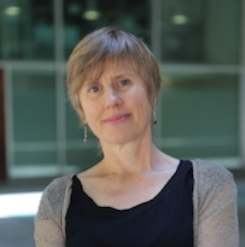
Rachel Green
Johns Hopkins School of Medicine
USA
EMBL Conference
For late registrations please contact Diah Yulianti at diah.yulianti@embl.de
This conference will take place at EMBL Heidelberg, with the option to attend virtually.
Mechanisms that shape cellular proteomes are critical for life. This conference focuses on the process of protein synthesis, from the molecular and structural understanding of the translational machinery to its regulation, its implications in cell and organismal biology, and its alteration in disease.
The regulation of mRNA translation is critical to maintain cell homeostasis and mediates cellular responses to environmental, physiological, and pathological cues. Given the central importance of protein synthesis, it is unsurprising that dysregulation or defects in mRNA translation are widely linked to disease, including cancer, neurological or metabolic disorders, and viral infection. In recent years, technical advances have challenged hitherto established dogmas, uncovered new quality control mechanisms, expanded the breath of translation regulators, enhanced our understanding of the dynamics of translation in living cells, and revealed unexpected interconnections with other cellular processes such as metabolism. Advances on these aspects of mRNA translation will be featured, as well as new insights into translation regulation in physiology and disease.
This conference is partnered with Cold Spring Harbor Laboratory (CSHL).
Please see EMBL’s COVID-19 safety recommendations if attending the on-site event.

Johns Hopkins School of Medicine
USA

MRC Laboratory of Molecular Biology
UK

University of Cambridge
UK

University of Leeds
UK

University of Illinois at Urbana-Champaign
USA

University of Surrey
UK

SciLifeLab – Karolinska Institutet
Sweden

Hubrecht Institute
The Netherlands

Institute of Biophysics – National Research Council (CNR)
Italy
Additional speakers will be selected from abstracts.

University of Glasgow
UK

Centre for Genomic Regulation (CRG)
Spain

EMBL Heidelberg
Germany
Got something to say? Tweet it! #EMBLProtein
| Time (Europe/Berlin) | Speaker |
|---|---|
| 16:00 – 18:00 | Arrival / Registration with light refreshments Conference Bus schedule (updated 31 Aug) |
| 16:30 – 17:30 | Pre-conference workshop “Ribosomes are decision hubs that control human embryonic cell fate trajectories“ by Immagina BioTechnology srl (registration required) |
| 18:00 – 18:10 | Welcome remarks by the scientific organisers |
| 18:10 – 18:20 | John Hershey Tribute Christopher S. Fraser – University of California, USA |
| 18:20 – 19:05 | Keynote talk 1 To be introduced by Alfredo Castello – University of Glasgow, UK From stress adaptation to off-target immune response: the physiological consequences of modified mRNA Anne Willis – University of Cambridge, UK |
| 19:05 – 19:50 | Keynote talk 2 To be introduced by Christian Spahn – Charité Berlin, Germany The colliding ribosome as a hub for translational regulation and signaling activation Rachel Green – Johns Hopkins School of Medicine, USA |
| 19:50 – 20:15 | Coffee break |
| 20:15 – 21:00 | Keynote talk 3 To be introduced by Matthias W. Hentze – EMBL Heidelberg, Germany A human translational initiation complex suggests two independent roles for the helicase eIF4A Venki Ramakrishnan – MRC Laboratory of Molecular Biology, UK |
| 21:00 – 22:30 | Welcome reception with light refreshments |
| Time (Europe/Berlin) | Speaker |
|---|---|
| 09:00 – 12:30 | Session 1 – Initiation |
| 09:00 – 09:10 | Introduction/overview from session chair Julie Aspden – University of Leeds, UK |
| 09:10 – 09:30 | Head and Embryo 80S monosomes are much more translationally active than 80S in other tissues Julie Aspden – University of Leeds, UK Not available on demand |
| 09:30 – 09:45 | Fine tuning the Integrated Stress Response through eIF2B regulation with small molecules Alisa Zyryanova – University of Cambridge, UK |
| 09:45 – 10:00 | Human tumor suppressor protein Pdcd4 binds to the 40S to inhibit translation initiation Jay Brito Querido – University of Michigan Medical School, USA Not available on demand |
| 10:00 – 10:15 | eIF4F activity is specifically regulated to maintain stem cell self-renewal in the Drosophila testis downstream of JAK/STAT Ruoxu Wang – UCL, UK |
| 10:15 – 10:30 | Uncovering the rules between the translation of specific mRNAs and their requirements of eIF4A1 activity and function Tobias Schmidt – Beatson Institute for Cancer Research, UK |
| 10:30 – 11:00 | Coffee break |
| 11:00 – 11:15 | Translation Initiation in Hypoxia: the case of the oncogene β-catenin Angelita Simonetti – Université de Strasbourg, France |
| 11:15 – 11:30 | Ribosome queuing induced by a stem-loop in the uORF2/ATF4 overlap represents yet another level of ATF4 translational control Anna Smirnova – Institute of Microbiology of the CAS, Czech Republic |
| 11:30 – 11:45 | Mechanism of transcript-specific translation repression by eIF3 Fatima Alghoul – Dana-Farber Cancer Institute/ Harvard Medical School, USA |
| 11:45 – 12:00 | Translating the translation process – developing eIF1A inhibitors as a research tool and potential cancer therapy Daniel Hayat – Weizmann Institute, Israel |
| 12:00 – 12:15 | Structural pathway of human translation initiation – from 43S PIC assembly to multi-step 48S IC remodeling Niels Fischer – Max Planck Institute for Multidisciplinary Sciences, Germany Not available on demand |
| 12:15 – 12:30 | Translation initiation at ambiguous start sites: setting the right frame Matthias Erlacher – Medical University of Innsbruck, Austria |
| 12:30 – 14:00 | Lunch |
| 14:00 – 17:30 | Session 2 – Ribosome/Elongation |
| 14:00 – 14:10 | Introduction/overview from session chair Hong Jin – University of Illinois at Urbana-Champaign, USA |
| 14:10 – 14:30 | From an ancient GTPase promoting protein synthesis in an evolutionarily conserved way to reconsidering translation pauses for control Hong Jin – University of Illinois at Urbana-Champaign, USA |
| 14:30 – 14:45 | Elucidating novel mechanisms coordinating ribosome biogenesis across cellular compartments Eliana Bianco – ETH Zürich, Switzerland |
| 14:45 – 15:00 | Mechanism of ribosome-associated mRNA degradation during tubulin autoregulation Markus Höpfler – MRC Laboratory of Molecular Biology, UK |
| 15:00 – 15:15 | Nascent chain folding and transient polysome rearrangements orchestrate co-translational protein complex assembly in bacteria Jirí Koubek – University of Heidelberg, Germany |
| 15:15 – 15:30 | Co-translational ribosome pairing enables native assembly of misfolding-prone subunits Sander Tans – AMOLF institute, The Netherlands Not available on demand |
| 15:30 – 16:00 | Coffee break & Meet the speakers of Day 1 and Day 2 |
| 16:00 – 16:15 | Identification and characterization of novel quality control factors safeguarding co-translational assembly pathways Ayala Shiber – Technion-Israel Institute of Technology, Israel Not available on demand |
| 16:15 – 16:30 | rRNA expansion segments: evolutionary tools to enhance translation accuracy Robert Rauscher – University of Bern, Switzerland |
| 16:30 – 16:45 | The molecular basis of tRNA selectivity by human pseudouridine synthase 3 (PUS3) and its impact on mRNA translation Leon Kleemann – University of Bern, Switzerland |
| 16:45 – 17:00 | Ribosomal protein paralogues in germline development Katarina Grobicki – University of Cambridge, UK |
| 17:00 – 17:15 | mRNA selective functions of eIF3 in mRNA translation and cancer Dieter Wolf – Westlake University, China |
| 17:15 – 17:30 | Translation factor eIF5A is the sensor and effector for autoregulation polyamine synthesis Ivaylo Ivanov – National Institutes of Health, USA |
| 17:30 – 18:00 | Pre-dinner drinks |
| 18:00 – 19:30 | Dinner |
| 19:30 – 21:30 | Poster session 1 (odd numbers) in ATC Helices List of posters |
| 21:30 – 22:30 | Wine & Cheese in ATC Rooftop Lounge |
| Time (Europe/Berlin) | Speaker |
|---|---|
| 09:00 – 11:30 | Session 3 – Methods/Systems approaches |
| 09:00 – 09:10 | Introduction/overview from session chair Vicent Pelechano – SciLifeLab – Karolinska Institutet, Sweden |
| 09:10 – 09:30 | Genomic dissection of co‑translational mRNA decay, from metadegradome sequencing to genome‑wide frameshifts Vicent Pelechano – SciLifeLab – Karolinska Institutet, Sweden |
| 09:30 – 09:45 | In vivo single-cell ribosome profiling to investigate translational regulation in aged epidermal stem cells Clara Duré – University of Zurich, Switzerland |
| 09:45 – 10:00 | Measuring changes in translation efficiency with single-cell ribosome profiling Michael VanInsberghe – Hubrecht Institute-KNAW, Oncode Institute, and University Medical Center Utrecht, The Netherlands |
| 10:00 – 10:15 | CITePuro-seq: unlocking the secrets of immune cells plasticity with an innovative translatomic technique Stefania Oliveto – INGM-Unimi, Italy Not available on demand |
| 10:15 – 10:45 | Coffee break |
| 10:45 – 11:00 | Comparative CRISPRi screens reveal cell context-dependent quality control during mRNA translation Geraldine Rodschinka – Max Planck Institute of Biochemistry, Germany Not available on demand |
| 11:00 – 11:15 | NaP-TRAP-seq uncovers changes in the regulatory activity of 5’-UTRs on translation during early vertebrate development Jean-Denis Beaudoin – University of Connecticut Health Center, USA |
| 11:15 – 11:30 | Modeling tRNA determinants of codon translation efficiency in human cells Xavier Hernandez – Alias Centre for Genomic Regulation, Spain |
| 11:30 – 16:00 | Free time / Sightseeing |
| Session 4 – Interconnections/Turnover | |
| 16:00 – 16:10 | Introduction/overview from session chair Marvin Tanenbaum – Hubrecht Institute, The Netherlands |
| 16:10 – 16:30 | Dissecting the translation elongation phase through ultra-long tracking of individual ribosomes Marvin Tanenbaum – Hubrecht Institute, The Netherlands |
| 16:30 – 16:45 | Old dogmas revisited (and reshaped): A new view of the landscape of bacterial coupled transcription-translation Mikel Irastorza – The Hebrew University of Jerusalem, Israel Not available on demand |
| 16:45 – 17:00 | Real-time tracking of transcription-translation coupling Olivier Duss – EMBL Heidelberg, Germany Not available on demand |
| 17:00 – 17:15 | Structural basis of ribosomal 30S subunit degradation by RNase R Helge Paternoga – University of Hamburg, Germany Not available on demand |
| 17:15 – 17:30 | Co-translational intactions of importins with nascent nuclear cargo Maximilian Seidel – Max Planck Institute of Biophysics, Germany |
| 17:30 – 18:00 | Coffee break |
| 18:00 – 18:15 | Variant in EPRS1 mRNA from Hypomyelinating Leukodystrophy Patients Blocks m6A Modification at Variant-distal Sites, and Inhibits Nuclear Export and Translation Paul Fox Lerner – Research Institute, Cleveland Clinic, USA |
| 18:15 – 18:30 | LARP1 senses free ribosomal subunits to coordinate supply and demand of ribosomal proteins James Saba – Johns Hopkins University School of Medicine, USA |
| 18:30 – 18:45 | Hypoxia-induced epigenetic changes coordinate transcription start site selection and translational control through remodeling of 5’UTRs Kathleen Watt – Karolinska Institutet, Sweden |
| 18:45 – 19:00 | mRNA Location and Translation Rate Determine Protein Targeting to Dual Destinations Stavroula Mili – National Cancer Institute, NIH USA |
| 19:00 – 19:30 | Pre-dinner drinks |
| 19:30 – 20:30 | Dinner |
| 20:30 – 22:30 | Poster session 2 (even numbers) in ATC Helices List of posters |
| 22:30-23:30 | Wine & Cheese in the ATC Foyer |
| Time (Europe/Berlin) | Speaker |
|---|---|
| 09:00 – 12:30 | Session 5 – Metabolism/Disease/Viruses |
| 09:00 – 09:10 | Introduction/overview from session chair Gabriella Viero – Institute of Biophysics – National Research Council (CNR), Italy |
| 09:10 – 09:30 | Loss of interactions between SMN and ribosomes leads to the disruption of a multifunctional translation platform: implications for Spinal Muscular Atrophy Gabriella Viero – Institute of Biophysics – National Research Council (CNR), Italy |
| 09:30 – 09:45 | Regulation of poly(A)-tail length and translation in oocytes and early embryos Kehui Xiang – Whitehead Institute for Biomedical Research, USA Not available on demand |
| 09:45 – 10:00 | 28S rRNA fragment serves as biomarker for early cancer detection Rastislav Horos – Hummingbird Diagnostics GmbH, Germany Not available on demand |
| 10:00 – 10:15 | Mitochondrial import of the F1-ATP synthase subunit ATP5A1 is enhanced by RNA Aindrila Chatterjee – EMBL Heidelberg, Germany |
| 10:15 – 10:30 | Regulation of PINK1 translation via modulation of insulin and AMPK signaling to support mitophagy in neurons Jara Tabitha Hees – Max Planck Institute for Biological Intelligence, Germany |
| 10:30 – 11:00 | Coffee break |
| 11:00 – 11:15 | Discovery of factorless internal ribosome entry sites through metagenomic data mining Nicolas Salcedo-Porras – The University of British Columbia, Canada |
| 11:15 – 11:30 | Activation of an antiviral endonuclease, RNase L alters the transcriptional landscape through changes in translation during innate immunity Agnes Karasik – National Institutes of Health / NIDDK, USA |
| 11:30 – 11:45 | Universal features of Nsp1-mediated translational shutdown by coronaviruses Evangelos Karousis – University of Bern, Switzerland |
| 11:45 – 12:00 | Human MCTS1-dependent translation of JAK2 is essential for IFN-g immunity to mycobacteria Jonathan Bohlen – Necker Hospital for Sick Children, France |
| 12:00 – 12:15 | Blocking translation to rescue ALS/FTD phenotypes associated with C9ORF72 repeat expansion Franck Martin – University of Strasbourg, CNRS, France |
| 12:15 – 12:30 | Role of the RNA-binding protein YBX3 in Mesothelioma Angela Rubio Tenor – MRC-Toxicology Unit, UK |
| 12:30 – 14:00 | Lunch |
| 14:00 – 16:00 | Poster session 3 (all numbers) in ATC Helices List of posters |
| 16:00 – 19:00 | Session 6 – RNP plus RQC |
| 16:00 – 16:10 | Introduction/overview from session chair André Gerber – University of Surrey, UK |
| 16:10 – 16:30 | Phosphofructokinase is a conserved RNA-binding protein that modulates cell cycle progression André Gerber – University of Surrey, UK |
| 16:30 – 16:45 | Large-scale map of RNA binding protein interactomes across the mRNA life-cycle Lena Street – Columbia University, USA |
| 16:45 – 17:00 | eIF4E1b is a non-canonical eIF4E required for maternal mRNA dormancy Laura Lorenzo Orts – Institute of Molecular Pathology (IMP), Austria |
| 17:00 – 17:15 | Real-time assembly dynamics of an mRNP translation repression complex Marco Payr – EMBL Heidelberg, Germany |
| 17:15 – 17:30 | The multifaceted role of FMRP: translational repression, ribosome stalling, and potential implications for mRNA degradation via the no-go decay pathway MaKenzie Scarpitti – The Ohio State University, USA |
| 17:30 – 17:45 | Ribosome collision underlies ZAKalpha-mediated inflammation and programmed cell death in UV-irradiated skin Simon Bekker-Jensen – University of Copenhagen, Denmark |
| 17:45 – 18:15 | Coffee Break & Meet the speakers of Day 3 and Day 4 |
| 18:15 – 18:30 | Sequence context and ribosomal collisions affect the suppressor tRNA efficiency Nikhil Bharti – University of Hamburg, Germany |
| 18:30 – 18:45 | Molecular basis of eIF5A-dependent CAT tailing in eukaryotic ribosome-associated quality control Petr Tesina, CEITEC MU, Czech Republic Not available on demand |
| 18:45 – 19:00 | Ubiquitin code for helicase-driven clearance of colliding ribosomes Toshifumi Inada – The University of Tokyo, Japan |
| 19:00 – 19:15 | The helicase HrpA splits stalled ribosomes in E. coli Annabelle Campbell – Johns Hopkins University, USA |
| 19:15 – 19:30 | Power naps: a new mechanism of bacterial ribosome hibernation Sergey Melnikov – Newcastle University, UK |
| 19:30 – 19:45 | Closing remarks |
| 19:45 – 21:30 | Conference Dinner |
| 21:30 – 00:30 | Conference Party |
Departure day
For late registrations please contact Diah Yulianti at diah.yulianti@embl.de
On-site registration fees include admission, conference materials, meals and coffee breaks. Participants are expected to book and pay their own accommodation and travel expenses.
Virtual registration fees include access to all of the talks (livestreamed and on demand) and facility to submit questions.
| On-site Academia | €775 |
| On-site PhD Student | €675 |
| On-site Industry | €975 |
| Virtual Academia | €200 |
| Virtual PhD Student | €150 |
| Virtual Industry | €250 |
A letter to support your visa application will be issued, on request, once payment of the registration fee is confirmed. We recommend that you book your visa appointment as soon as possible, to avoid any delay with your visa application.
Accredited journalists may be eligible to register for complimentary press registration. Registrants may be required to provide accreditation or equivalent proof of press membership after registration. Please contact diah.yulianti@embl.de for more information. Please note that we do not offer complimentary registrations for editors of scientific journals.
Registration will be on a first come, first served basis. Your place can only be confirmed after payment of the registration fee. If you are added to our waiting list, please consider taking advantage of our offerings to participate virtually.
On-site participants: Types of payments accepted are international bank transfers and credit card payments.
Virtual participants: We are only able to accept card payments. In exceptional cases we can accept bank transfers. Please contact events@embl.de for details.
Only participants registering to attend the on-site event are eligible to submit an abstract. Abstracts will not be accepted from virtual participants.
After registration you can submit your abstract via a separate link that will be provided in the email confirmation. Alternatively, you can access the link on the confirmation page directly after registering. The same login credentials are used for both processes.
Please note:
Abstract body: The limit of 2000 characters refers to manually typed text and excludes spaces. If an error occurs try using a different web browser (preferably Google Chrome or Mozilla Firefox).
If you copy-paste the text into the form, hidden formatting might still be included which may cause the text to exceed the 2,000 character limit resulting in an error message. We recommend you clear all formatting before pasting in the text.
If you have special symbols in your text, make sure you are using Unicode characters, otherwise these will not be recognised.
Title: The title should not exceed 20 words. Only the first word of the title should start with a capital letter and the rest should be lowercase.
Authors and affiliations: Please fill in the author’s details as requested in the online form. The compulsory fields are: First Name, Last Name, Organisation Name (Affiliation or Company), Country and Email.
Kindly mark only one author in the role of First Author and please don’t forget to indicate who will be the Presenter.
Please enter your co-authors correctly via the system by adding accounts together with their organisation/institute. Do not copy-paste them into the body of the abstract text, as they will not be indexed in the abstract book.
Presentation types: When submitting your abstract, you can apply for an oral or poster presentation. A selection process will take place with the results announced 2-3 weeks after the abstract submission deadline.
For detailed instructions on how to submit a conference abstract, follow the instructions provided in this video.
Please check our FAQs pages for further information on how to submit an abstract.
Limited financial assistance is provided by the EMBL Advanced Training Centre Corporate Partnership Programme and EMBO in the form of both registration fee waivers and travel grants. These are available for on-site participants at EMBL Conferences and EMBO|EMBL Symposia, and for on-site and virtual participants at EMBO Workshops. We are currently working on securing funding for all virtual participants, and ask that you please apply for financial assistance for both on-site and virtual participation.
Your place in the meeting is only confirmed by paying the registration fee, which is mandatory even when receiving a fee waiver.
The fee waiver will cover the registration sum that you have paid to attend the course or conference.
The travel grant will cover the cost of travel to an on-site event (airfare, train, bus, taxi, accommodation, visa, and/or registration fees*) and is provided up to specified caps which are normally as follows:
–up to €400 for participants travelling to an EMBL Conference or EMBO|EMBL Symposium from within Europe.
–up to €1000 for participants travelling to an EMBL Conference or EMBO|EMBL Symposium from outside Europe.
–up to €500 for any participant travelling to an EMBO Workshop.
–up to €1000 for any participant working in Chile, India, Singapore or Taiwan travelling to an EMBO Workshop.
–up to €700 for any participant working in Croatia, Czech Republic, Estonia, Greece, Hungary, Italy, Lithuania, Luxembourg, Poland, Slovenia, and Turkey travelling to an EMBO Workshop.
*Registration fees are only covered for EMBO Workshops
The organisers may reduce the grant cap to accommodate more participants. Recipients will be notified of their travel cap amount when they are informed of the outcome of their application. Original receipts must be provided with your signature for all costs incurred within two months of completion of travel. Scanned copies cannot be accepted.
For EMBO Workshop participants with children, there is the possibility to apply for a childcare grant to offset child care costs incurred by participants or speakers when participating at a conference. Eligible costs include fees for a baby-sitter or child-care facility, travel costs for a caregiver, or travel costs for taking the child to the meeting etc. Please note that priority will be given to early stage researchers. A maximum amount of €500 can be awarded per participant applying for an EMBO childcare grant. In order to apply for this grant for EMBO Workshops, you must be registered by the abstract submission deadline.
On-site participants
You may apply for financial assistance when submitting your abstract. In your application you will be asked to answer questions regarding why your lab cannot fund your attendance and how your attendance will make a difference to your career. Application for financial support will not affect the outcome of your registration application.
Virtual participants
If you are attending virtually, you can apply for financial assistance in the submission portal by the abstract deadline. Read the instructions on how to apply for financial assistance. Only submissions for financial assistance will be accepted. Presentation abstracts cannot be submitted here and will be declined.
In your application you will be asked to summarise your current work, answer questions regarding why your lab cannot fund your attendance, and how your attendance will make a difference to your career. Application for financial support will not affect the outcome of your registration application.
The scientific organisers will select the recipients of all financial assistance during the abstract selection process. Results will be announced approximately 6 – 8 weeks before the event start date, however for some events this may be delayed. Selection results do not impact your admission to the meeting. Selection is based on scientific merit, your current work or study location, the reasons for needing financial support, and the impact this event will have on your career.
Costs will be reimbursed after the meeting only once a reimbursement form and original receipts (from travel costs) have been received.
View our list of external funding opportunities and information on attending a conference as an event reporter.
For further information about financial assistance please refer to the FAQ page.
Accommodation is not included in the conference registration fee.
The hotels below have rooms on hold for participants until Monday 7 August 2023, in some cases at special rates. Please email the hotel directly, quoting the booking code TRC23-01 to confirm the exact price of the room.
Conference shuttle buses are free of charge for participants, and depart from designated bus stops near the hotels to EMBL and back, mornings and evenings.
The bus stops for this conference are:
Here are the shuttle bus times (Updated 31 August) for this conference.
View Conference shuttle bus stops and hotels in a larger map. Please note that not every bus stop will be used for every event.
Address: EMBL, Meyerhofstraße 1, 69117 Heidelberg, Germany. For further information on getting to EMBL Heidelberg visit Public Transportation to the Venue. For information about accommodation and local transportation please refer to the FAQ page.
All meals and coffee breaks are included in the registration fee. Our catering staff will prepare a wide variety of vegetarian meals, meat and fish dishes, soups, pasta, fresh fruit and vegetables, as well as a variety of desserts.
Please wear your badge at all times when serving yourself.
No food or drinks are allowed in the auditorium.
There are lockers available next to the stairs leading down into the Auditorium. You will find some of those equipped with sockets to charge your smartphone/tablet etc.
In most places the electricity is 220 volts AC (50 cycles). An adaptor and a plug that fits the German socket may be needed for your appliances/laptop (i.e. American, Japanese, etc.). A USB charging station for electronic devices is available at the registration desk.
If you are interested in purchasing an EMBL souvenir (products presented in the glass display in the registration area), please ask at the registration desk for more information.
Please read EMBL’s COVID-19 safety policy for on-site events.
Do not smoke in any EMBL building.
Eating and drinking is prohibited in the Auditorium and all laboratories.
Do not enter any restricted areas or the laboratories unless instructed to do so.
If first aid is required …
In case of fire …
Beyond first aid…
Please remember to bring your own medication, if needed, to the conference. Note that the next pharmacy is a 4-minute drive from the EMBL, but for many medications you will be required to see a doctor to get a prescription.
Ensure in advance that your medical insurance will cover you during your visit in the event that you do need to see a doctor while in Heidelberg. In any case, the EMBL Course and Conference Office will assist you to get to the pharmacy and a doctor of your choice if necessary.
Wi-Fi is available on campus using the EMBL-Events network and the event specific password, which will be provided on site. The eduroam network (secure, worldwide roaming access service developed for the international research and education community) is also available.
‘’Lost and Found’’ items are kept at the registration desk until the end of the conference.
There are lockers available on-site to store your luggage, which require a 2 EURO coin to operate. There is another luggage room on level E0, which is free to use but remains unlocked during the conference.
There is a nursing room available in the ATC Rooftop Lounge on level A29.
During the conference, an EMBL Photographer may be taking photos. If you would not like to appear in these, please inform the photographer or a member of the Course and Conference Office.
We can help to print your boarding pass/train ticket. Please send it to events@embl.de and collect your print-outs at the registration desk.
There is a room for prayer, meditation and yoga located on level E0 behind the Auditorium. Please be respectful of others using the room.
A variety of activities in Heidelberg can be found on the website of Heidelberg Marketing.
During the event, we provide conference shuttle buses to and from EMBL. In addition, there is the public bus 39A that serves the EMBL campus and taxis can be easily booked at any time. Information on the conference shuttle buses can be found on the individual event website and more detailed information on travelling to EMBL can be found on our Travel Information page.
| Hello | Hallo |
| Goodbye | Auf Wiedersehen (formal) Tschüss (informal) |
| Good morning | Guten Morgen |
| Good afternoon | Guten Tag |
| Good evening | Guten Abend |
| Good night | Gute Nacht |
| I’m sorry | Es tut mir leid |
| Excuse me… | Entschuldigen Sie |
| How are you? | Wie gehts? |
| I’m fine thanks. And you? | Mir geht es gut , danke. Und Dir/Ihnen? |
| What is your name | Wie heißen Sie? (formal) Wie heißt du? (informal) |
| My name is.. | Ich heiße.. |
| Do you speak English | Sprechen Sie englisch? |
| I don’t understand | Ich verstehe nicht |
| Please speak more slowly | Können Sie bitte langsamer sprechen |
| Thank you | Dankeschön |
| Where is the toilet? | Wo ist die Toilette? |
| Please call me a taxi | Bitte rufen Sie mir ein Taxi |
| How do I get to….? | Wie komme ich zum/zur…..? |
| A beer/two beers please | Ein Bier/zwei Bier bitte |
| A glass of red/white wine please | Ein Glas Rot/Weisswein bitte |
| The menu, please | Die Speisekarte, bitte |
| Is there a local speciality? | Gibt es eine Spezialität aus dieser Gegend? |
| I’m vegetarian | Ich bin Vegetarier |
| It was delicious | Es war hervorragend |
| The bill, please | Die Rechnung, bitte |
| I have a headache | Ich habe Kopfschmerzen |
| I have a sore throat | Ich habe Halsschmerzen |
| My stomach hurts | Ich habe Magenschmerzen |
| I’m allergic to | Ich bin allergisch gegen |
| I need a doctor who speaks English | Ich brauche einen Arzt, der englisch spricht. |
Please note that only on-site participants are able to submit abstracts and participate in the poster sessions.
We are using an event platform for this conference. More information about the platform will be shared ahead of the conference.
Additional information can be found in our Code of Conduct.
It is important to stay healthy and move around, especially when you are attending an event virtually. We have put together a few coffee break stretches and yoga videos in the conference platform for you to enjoy during the event.
Please use the Q&A function in the event platform.
If you have any other questions, you can go to the Help Desk in the event platform. Click on ‘more’ on the top menu and click Help Desk.
The programme is planned based on the Europe/Berlin time zone, unless otherwise stated. Please take your time zone into consideration when planning your attendance.
Please find additional information including FAQs, terms and conditions, COVID-19 safety policy and travelling to EMBL on our Information for Participants page.
COVID-19 information for on-site events at EMBL Heidelberg can be found in our COVID-19 FAQs.
Silver sponsor
Media partners
EMBO Journal, an EMBO Press journal
International Union of Biochemistry and Molecular Biology
FEBS Journal, a FEBS Press journal
FEBS Letters, a FEBS Press journal
Bio Essays, a Wiley Online Library
Advanced Biology, a Wiley Online Library
Sponsorship opportunities
We offer a variety of event sponsoring possibilities, with the flexibility to select a set sponsorship package or combine individual sponsorship options to suit your event budget. Discounts are available for companies sponsoring multiple events at EMBL Heidelberg. View other conferences, or contact sponsorship@embl.de for further information on sponsoring possibilities.
If you are interested in becoming a media partner of this event, please visit our media partnerships webpage.
EMBL wishes to warn sponsors of EMBL conferences and courses of fraudulent schemes purporting to offer sponsorship opportunities on behalf of EMBL or affiliated with EMBL officials. One current scam campaign of which we are aware is conducted using the name ‘Judy Eastman’ (judy@gopcontact.a2hosted.com) and entails approaches to sponsors offering sponsorship opportunities on EMBL’s behalf. Please be kindly advised that all relevant communication regarding sponsorship of EMBL conferences, symposia and courses is handled by EMBL directly and is sent from an official EMBL account. EMBL does not work with any external providers on sponsorship acquisition.
Please also note that:
Suspicious communications purportedly from, for or on behalf of EMBL should be reported to EMBL at the following email address sponsorship@embl.de.
Want to let others know you’re attending this event? Take a look at our shareable media and feel free to use them in your social media channels or presentations.
For on-site participants only.
This industry webinar will be hosted by our sponsor Immagina BioTechnology srl prior to the EMBL Conference: Protein synthesis and translational control
on Wednesday 6 September 2023, 16:30 – 17:30
Participation in this workshop is free of charge for registered on-site conference attendees. The number of available places is limited (first come, first served).
All registered conference attendees will receive an email with a registration link in the beginning of August.
ABSTRACT
Ribosomes are decision hubs that control human embryonic cell fate trajectories
Prof. Leo Kurian
University of Cologne, Germany
The blueprints of developing organs are preset at the early stages of embryogenesis. Transcriptional and epigenetic mechanisms are proposed to preset developmental trajectories. However, we reveal that the competence for the future cardiac fate of human embryonic stem cells (hESCs) is preset in pluripotency by a specialized mRNA translation circuit controlled by RBPMS. RBPMS is recruited to active ribosomes in hESCs to control the translation of essential factors needed for cardiac commitment program, including Wingless/Integrated (WNT) signaling. Consequently, RBPMS loss specifically and severely impedes cardiac mesoderm specification, leading to patterning and morphogenetic defects in human cardiac organoids. Mechanistically, RBPMS specializes mRNA translation, selectively via 3′UTR binding and globally by promoting translation initiation. Accordingly, RBPMS loss causes translation initiation defects highlighted by aberrant retention of the EIF3 complex and depletion of EIF5A from mRNAs, thereby abrogating ribosome recruitment. We demonstrate how future fate trajectories are programmed during embryogenesis by specialized mRNA translation.
Date: 6 - 10 Sep 2023
Location: EMBL Heidelberg and Virtual
Venue: EMBL Advanced Training Centre
Deadline(s):
Abstract submission: Closed
Registration (On-site): Closed
Registration (Virtual): Closed
Organisers:
Contact: Diah Yulianti